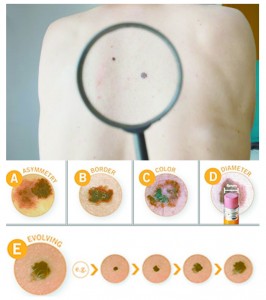 May is melanoma & skin cancer awareness month, and InterCommunity Cancer Center in Lady Lake, Florida, wants to know, “who’s got your back?” The back is the most common location for melanoma, the deadliest form of skin cancer.
May is melanoma & skin cancer awareness month, and InterCommunity Cancer Center in Lady Lake, Florida, wants to know, “who’s got your back?” The back is the most common location for melanoma, the deadliest form of skin cancer.
Adequately applying sunscreen to your own back can be difficult. Find a family member or friend who “has your back” when applying sunscreen. 43 percent of people rarely or never ask someone else to apply sunscreen to their back and 37 percent rarely or never apply sunscreen to their back at all. In addition, seek shade and wear protective clothing to protect your skin whenever possible.
Even if you have carefully practiced sun safety all summer, it’s important to continue being vigilant about your skin in fall, winter, and beyond. Throughout the year, you should examine your skin head-to-toe once a month, looking for any suspicious lesions. Self-exams can help you identify potential skin cancers early, when they are most treatable. Have someone else help you examine hard to see areas, such as your back.
First, for a successful self-exam, know what to look for. As a general rule, take note of any new moles or growths, and any existing growths that begin to grow or change significantly in any other way. Lesions that change, itch, bleed, or don’t heal are also alarm signals. Screenings and early detection are key to effective treatment.
Know the ABCDEs of Melanoma
A = Asymmetry: one half is unlike the other half
B = Border: an irregular, scalloped or poorly defined border
C = Color: is varied from one area to another; has shades of tan, brown or black, or is sometimes white, red, or blue
D = Diameter: Melanomas are usually greater than the size of a pencil eraser when diagnosed but can be smaller
E = Evolving: a mole or skin lesion that looks different from the rest or is changing in size, shape, or color
InterCommunity Cancer Center recommends consulting your dermatologist immediately if you notice anything changing, itching or bleeding on your skin.
Melanoma & Skin Cancer Risk Factors
Factors that may increase your risk of melanoma include fair skin, a history of sunburn (One or more severe, blistering sunburns), excessive ultraviolet (UV) light exposure (from the sun and from tanning lights and beds), living closer to the equator or at a higher elevation, having many moles (more than 100) or unusual moles, a family history of melanoma, and a weakened immune system.
Melanoma & Skin Cancer is Treatable
ICCC offers the Freiburg Flap Procedure for the treatment of skin cancer. This innovative treatment, developed in cooperation by Dr. S. Stange from the Albert Ludwigs University in Freiburg, Germany, provides an excellent alternative for orthovoltage or electron treatments.
“By incorporating the Freiburg Flap procedure into our treatment program, we can offer our patients highly customized treatments that yield significant results in 6 to 8 visits versus 20 to 25 visits as compared to traditional external beam radiation,” said Dr. Jeffrey Kanski, Radiation Oncologist.
The treatments are well tolerated by patients and are good for all different types of skin cancers, including cutaneous lymphoma and Kaposi’s sarcoma. It is especially effective on cancers located on sloped or curved areas of the body, such as the head, face, neck, foot and ankle.
ABOUT INTERCOMMUNITY
CANCER CENTER
InterCommunity Cancer Center (ICCC) has 30 years of experience providing quality, personalized cancer care in the Lady Lake and Leesburg communities and has treated more than 10,000 patients. Radiation Oncologists Drs. Hal Jacobson, Jeffrey Kanski and Maureen Holasek bring exceptional expertise in treating breast, lung, prostate, gynecologic, skin and other cancers. As part of McKesson Specialty Health, Vantage Oncology and the US Oncology Network, McKesson’s physician-led network of integrated, community-based oncology practices, provide patients and practices with a best-in-class platform and a robust suite of customizable offerings and services. This includes comprehensive oncology management services across Radiation Oncology, Surgical specialities, and Medical Oncology while maintaining a focus on community-based oncology care and innovative value-based cancer services.
ICCC has access to clinical information and best practices from the treatment of more than 1,000 patients per day enabling highly effective and peercollaborated treatments. This provides ICCC the ability to offer academic-quality treatment in a community based setting and gives local communities exceptional cancer care services close to home. To learn more, visit www.ICCCVantage.com.
InterCommunity Cancer Center
(352) 674-6300
www.ICCCVantage.com
Check Also
Recurrent UTIs: Addressing the Risk of Antibiotic Resistance
Urinary tract infections (UTIs) are common bacterial infections that affect millions of individuals worldwide each …
 Central Florida Health and Wellness Magazine Health and Wellness Articles of the Villages
Central Florida Health and Wellness Magazine Health and Wellness Articles of the Villages



